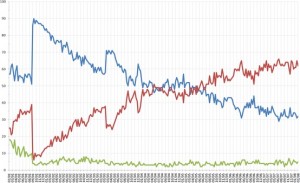IQS Research is always happy to see our work in action!
Click here to read the original article written by Sheldon S. Shafer from the Courier Journal.
Although the surveyor said that much of the support is “lukewarm,” more than 70 percent of residents in five Louisville-area counties say they would vote for a tax increase to improve Transit Authority of River City service, a new opinion survey has found.
But TARC Executive Director Barry Barker said that no fare increase, or effort to raise the transit tax, is on the horizon.
TARC ridership now totals about 14.3 million passengers annually, but the survey found that 84 percent of residents in the five counties say they have not ridden TARC in the past year and 91 percent report that they are unlikely to ride in the near future.
Still, Barker said in an interview that he is not discouraged by the results, noting that “while TARC would like to see the portion of the population that has ridden in the last year to be higher, the number is comparable” to ridership in cities that are roughly the same size as Louisville.
In connection with the public opinion survey, Barker said TARC has begun what he termed a “comprehensive operational analysis — a complete analysis of service and potential improvements.”
Barker said that as a product of the in-house review, the transit company may tweak service on some routes but probably won’t undertake wholesale changes.
“We want to make sure we are doing the right things, and doing things right,” he said.
TARC currently operates on a $73 million annual budget, about $43 million of which is provided by a trust fund fueled by a two-tenths of a 1 percent occupational tax levied on people who work in Metro Louisville. TARC hasn’t raised ride rates for several years.
The survey work was recently completed by IQS Research of Louisville at a cost to TARC of $103,000, said TARC spokesman Russell Goodwin. The TARC survey was conducted in Jefferson, Oldham, and Bullitt counties in Kentucky, 400 from Jeffersonville and in Clark and Floyd counties in Indiana.
It was based on phone interviews with about 600 participants — around 400 of which were from Jefferson County — chosen at random and “approximately representative across the five-county TARC service area,” the research company said. Sampling took place this past March 11-22. The margin of error is plus or minus 4 percent, IQS said.
Among the key survey findings:
- – 16 percent of the respondents had ridden TARC in the past year. Sixty-eight percent of non-riders knew the location of the nearest bus stop, 76 percent said they knew how to plan a TARC trip, and 45 percent said they were generally familiar with the fare structure.
- – The four main barriers to riding TARC were reported to be: a lack of available routes (41 percent), a lack of frequency of service (32 percent), and routes that were too indirect or that riders had to spend too much time on the bus before reaching the destination (both 31 percent). People could cite more than one reason.
- – Among the roughly nine in 10 people who seldom, if ever, ride the bus, circumstances that would encourage people to use public transportation included there being no other option (26 percent) and new service becoming available (17 percent).
- – In response to why is TARC important, 84 percent said providing transportation to work, 83 percent said ensuring mobility for the elderly and disabled, and 80 percent said helping Louisville to be environmentally friendly.
- – Asked “what would be your position if there was a vote today to increase the current occupational tax by two-tenths of 1 percent?” — or doubling the current tax — 71 percent said they would probably favor or definitely favor” the increase.
- – Among regular TARC riders, 70 percent said the bus service is very important to them.
Barker said he views the survey as reflecting a “clear understanding by the residents of how important and critical TARC service is to people who ride. The survey reflects the knowledge that TARC is the link connecting people to jobs, education, and other vital services.”
Barker said TARC does not plan any major service adjustments on routes or in fares, based exclusively on the survey results.
But he noted that TARC is soon expanding service to Jefferson Riverport International, thanks to a grant from the Kentucky Transportation Cabinet. Additionally, TARC plans to install a new fare-collection system on buses by the end of the year that will allow the use of “smart” or tap-and-go cards when boarding.
Barker said the survey “provides us with some very critical information — not only from the general public but also from our customers about how we can work smarter to provide the service people need.”
Barker said that the TARC board intends to discuss the survey results in coming months, as part of the larger discussion on the authority’s future.
“TARC is at a nexus,” he said. “The service we currently have on the street is not sustainable.”
He said that means that too often the authority has to use one-time funding sources for recurring operating expenses — “and the current service levels are not sufficient to meet the demand.”
Barker said the comprehensive analysis will attempt to identify what routes have excess capacity and when buses are overcrowded. He said the goal is to find ways to increase the frequency of bus runs, especially on the busiest routes.
Primarily because of funding limitations, Barker said that “unfortunately, we are compelled to make a patchwork quilt out of our service in order to respond to people who need the bus.”





